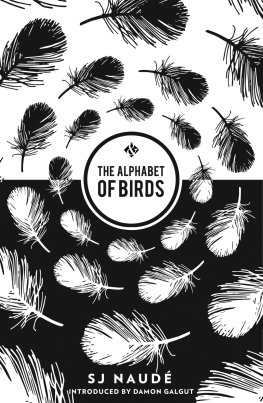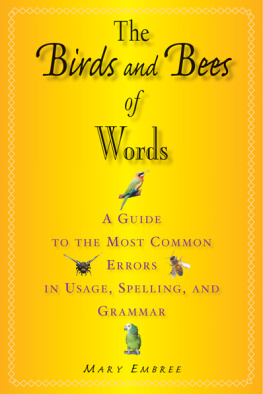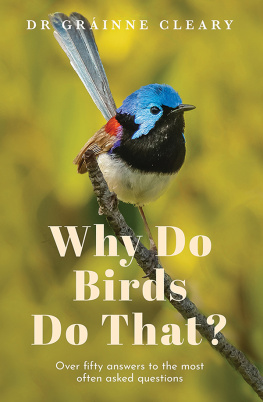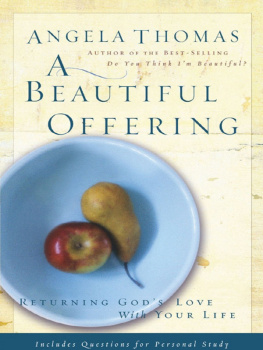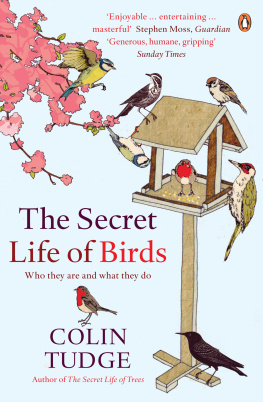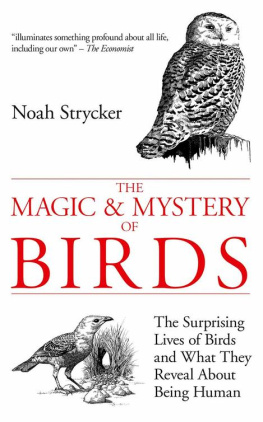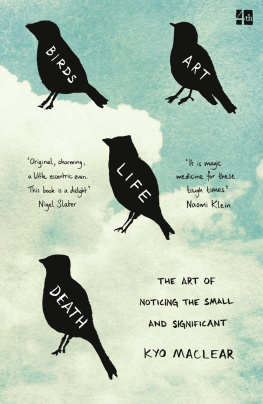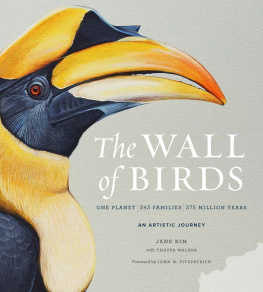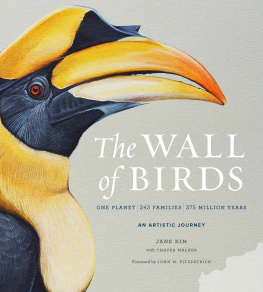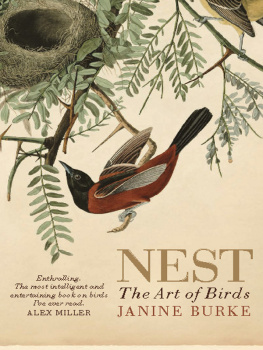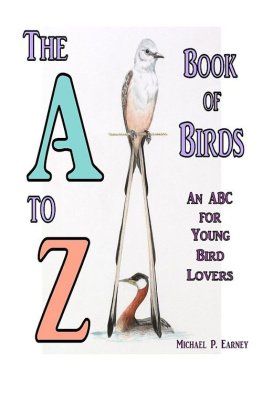SJ Naud
The Alphabet of Birds
The two men arrive simultaneously from opposite directions. Their taxis disappear down the street. They stand in silence in front of a steel door set in a long wall.
The drive from his hotel on the other side of the city to these streets, with their warehouses and grey industrial yards, has left Chris dizzy. He gauges the other mans accent when he speaks into the intercom. The vowels between his American rs are flat enough to be South African (Afrikaans?). The American South African (or South African American) is impatient, his shoulders pushing against the steel before the bolt retracts electronically. Behind the door is a concrete yard and a row of trucks. In the fading light, the man walks purposefully to a second steel door. Another intercom: the shoulder wedged in again, legs like levers.
Chris is unprepared for the scene behind the second wall: a villa, 1920s or 30s, in a large, treed garden, torches on the lawn. Light falls over them from the open windows. In the tall front door, Chriss friend Frederike appears. Her shadow shrinks when she walks out to him, cheeks lit by torch flames, arms stretched out.
Youve managed to find our estate! She puckers her lips in a pseudo-posh manner. Here in the provincias different spatial rules apply, you know.
Her breath is all cigarette when she kisses Chriss cheeks. He stoops over her, pressing her close. He has missed her, this Friesian woman, once a fellow student in London. He turns around, but the American has already been pulled into a small group of guests on the lawn. She takes Chris by the arm, leading him inside.
Come and meet Tita, she says. Her neck flushes.
It feels as if I know her like my own sister, Fred, Chris says. Remember the descriptions in your letters?
Once inside, he needs to raise his voice. The vaulted ceilings of the reception rooms echo with the chatter and laughter of guests in summer outfits. There are tables with cold meats, cheeses, breads, yellow butter.
It is such a joy, Fred shouts up at him, to be living with her in this place! Like contadini, like peasants, but in the heart of Milan, and in a huge villa, and to be surrounded by so many friends. Oh, here you are!
She grips the arm of a statuesque woman, drags her away from a posse of guests. Over her shoulder Tita gestures helplessly to her conversation partners. She turns to Chris.
Fred introduces them. An incongruous couple, Chris thinks. Fred is now bent over a cigarette paper, wetting it with her tongue before rolling the tobacco, her eyes behind a dark, oily fringe. And next to her, blonde Tita: a living Giacometti, bones as thin as branches. They are both looking at him, their gazes devoid of expectation or demand. Rarely has he struck up a friendship as effortlessly as with Fred, and he recognises something of Freds benevolence in Titas eyes too, the same openness and joy.
Titas a concert pianist, Fred says, lifting Titas fingers with her cigarette-free hand. I know, he could say, youve been devoting paragraphs of your letters to her talent, but he only smiles and touches Titas fingers, which are hanging between them as if belonging to no one.
Fred raises her nose as if smelling something that is burning. She drops Titas hand. She takes a drag on the cigarette and exposes a mouth full of sharp little teeth before scurrying away towards the kitchen.
Tita stands closer to him. Fred has told me a lot about you.
Likewise, he says.
They smile broadly at each other. The room is glowing.
What a wonderful house. Remind me, when did you move in?
Fred moved in about a year ago and started fixing the place up. Ive only been here a few months. Were very happy, Tita says. Its unimaginable, of course, this place: a country villa amidst the industrial grit, two penniless girls in such a rambling old pile, a structure that Mussolini would have been proud of. But here it is!
She holds up her pianists hands in an improbable gesture, as if to support the entire building. At night it looks more idyllic than it is you should have a wander in the garden later, were on the canal but during the day its a different story: shutters closed against the lorries and the factories, dust and ash settling on the garden She leans in slightly towards him, the scent of lemon rising from her skin. Her Italian cadences relax him.
Behind her, Fred passes by with a pot of soup, her head in the steam. Against the vapour and the glowing light, Chris looks at Titas bone structure with astonishment: angular, like something from a Futurist painting.
Fred rejoins them.
Tita was just telling me about the joys of your monumental house.
A nest rather than a monument, she says. A lesbian nest among the machines. She pouts grandly. A crumbling barricade against the merciless march of production. The sharp little teeth shimmer as she laughs. Like a warship that ran aground in the thirties, here at the edge of the canal Oh, Chris, she says, taking his hand, I have to introduce you to someone. Theres another South African here tonight or, like you, a lapsed South African, she quickly corrects herself.
Tom, he says without hesitating. Its Tom, isnt it?
She is taken aback. Do you know him, then?
But he has surprised himself. He does not, in fact, know Tom.
Well, strange as it may sound, no, but he arrived with me, if Im not mistaken. Dont you remember?
The name has come from nowhere. He has no idea how he has attached it to the man the Afrikaans American, or American Afrikaner.
Fred is searching his face with a frown. Tita keeps smiling as if the entire universes contradictions are to be reconciled. Her fingers keep moving.
Fred stops trying to figure out Chriss response, but remains anxious. She slips her fingers through Titas.
Come, you have to play for the guests, she says.
She leads Tita to the piano, climbs onto a side table and holds her short arms aloft. On the chair behind the shabby grand piano, Tita suddenly looks defeated. Hungry, thinks Chris; she is looking ravenously hungry. Gradually the guests quieten down.
Everyone is waiting for Tita. Her hair ends are trembling slightly. She resembles porcelain in the moment before it breaks. She has completely frozen, arms by her sides, the keys untouched. No note will flow from her fingers tonight. Chris has to suppress his urge to go to her rescue.
His eyes settle on the figure right behind Tita: a bony Northern European. He looks deeply uncomfortable. He has the kind of body, Chris thinks his attention now divided between the man and Tita that will never be able to give and receive unbridled love. At the edge of the silence, he notices someone else move from the corner of his eye. The figure slips out of the front door. Chris hesitates for a moment, then decides to leave the rescue action to Fred. He follows.
It is quiet in the garden. He pursues the shadow around the corner and along the side of the house. At the base, the walls widen, like the pedestal of a neoclassical monument. He keeps his left shoulder against the granite. He opens his palm against the wall, looks up. This side of the house is almost windowless, amplifying the scale. Towards the garden wall some distance to his right, plants are weighed down by weeds. The man in front walks to the edge of the lawn, where it drops abruptly to the canal. The house, Chris notices, is built right to the edge too. The rush of water is audible.
Chris keeps his distance, waiting. The glow of a lawn torch somewhere behind them illuminates the mans back. He is standing on the lawn between the corner of the house and a birch tree growing over the canal, steadying himself against the tree with one hand and the house with the other. He leans forward and disappears.

